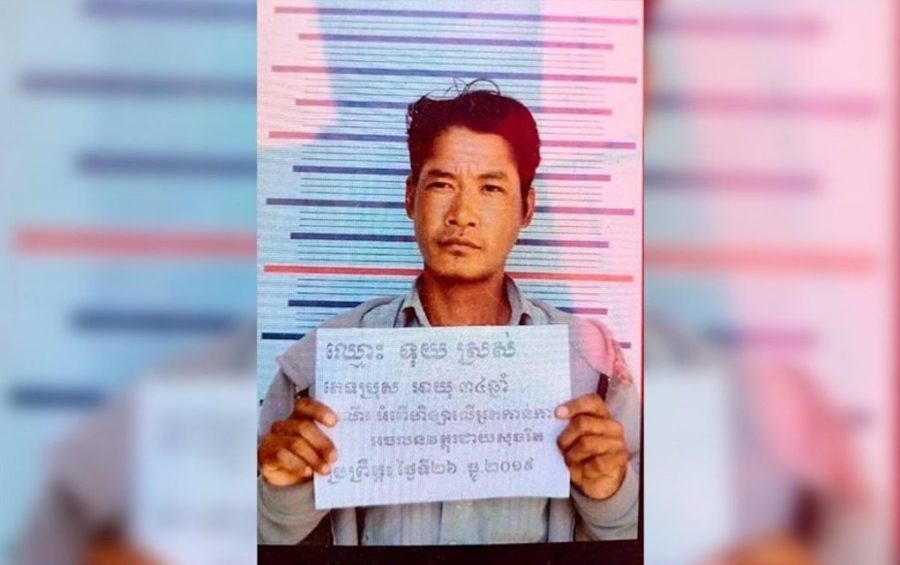Three land rights activists say they were beaten at the Banteay Meanchey provincial military police headquarters alongside a fellow detainee who later died after being transferred to the provincial prison.
Tuy Sros, 34, and four others were arrested on December 28 amid a protest in front of the provincial hall over a land dispute. Four days later, on January 1, Sros died while being transported from the prison to a hospital, according to local authorities and his family.
The provincial administration, in a statement dated January 1, claimed Sros had died from alcohol withdrawal.
But three of the four surviving detainees — An Ruon, Nov Noeun and Him Kiry — have since asked rights group Adhoc for legal help so they can take the military police to court, alleging violence at the hands of officers.
The five activists were “handcuffed and pushed into a car, and beaten, and pushed, necks twisted and beaten in the face,” Noeun told VOD on Sunday. “All five of us were pushed into a car and then dropped off in front of a flagpole. I supposed that we would stand to honor the national flag. We were made to sit in front of the flagpole. Then they lined us up and started kicking each of us three or four times. Me, they kicked three times and they added another punch and I lost a part of my tooth.”
Ruon, another of the activists, told VOD that the military police’s deputy provincial commander, Sar Bunsoeung, had ordered his subordinates to beat all five for answers. Noeun and Kiry made the same claim.
“They beat me repeatedly, bleeding all over my head. I got a cut on my eyelids from the beatings. They kneed me, kneed on the spine and dragged and beat me on the head, and then put a helmet on me, then dragged and twisted my neck,” Ruon said.
Sros’s wife Buy Kimlak and Yib Mak, the fifth detainee, could not be reached about why they had not joined the three others in seeking legal representation.
Kimlak, however, earlier told VOD that her husband’s corpse had bruises all over it. She had also visited him in prison after he was transferred from the military police headquarters to the provincial prison on December 31, and he was weak and barely conscious, she said.
She denied that he was unhealthy or an alcoholic, as the provincial administration claimed.
“He was a good man and very smart. He didn’t have any problems. He was working in business every day, buying chickens every day. And he went on patrol and patrolled every day because he was a village security guard,” Kimlak said.
Authorities passed responsibility between each other.
National military police spokesman Eng Hy denied the abuse accusations, saying the provincial military police headquarters had nothing to do with the alleged violence.
“I’ve already said that this case is not within the jurisdiction of the military police. This case is within the jurisdiction of the provincial authorities and therefore the provincial authorities can explain it,” Hy said.
Ung Siphan, director of the provincial prison, said Sros’s death had nothing to do with his prison.
Prison was not a place for forcing answers out of suspects; prison was just a place to hold people while waiting for court processes, he said.
“No, brother. We didn’t touch him. Frankly, we have thousands of prisoners coming in and out, and till now there’s no such history — we’ve never touched any prisoner,” Siphan said.
Provincial police chief Ath Khem said police were not involved in the case.
Bunsoeung, the deputy commander accused of ordering the violence, could not be reached for comment. Born Bin, provincial military police commander, could not be reached over five days. Banteay Meanchey governor Um Reatrey also could not be reached.
Adhoc provincial coordinator Soum Chankea said he had received the request for legal help from the three activists and would be preparing legal representation for them.
On December 28, about 200 protesters from Changha commune in O’Chrou district gathered in the provincial capital to claim that security forces had burned down villagers’ homes two days earlier. Sros’s wife, Kimlak, said about 200 families had been accused of encroaching on state land and were facing violence at the hands of authorities.
However, the provincial hall statement of January 1 said authorities had visited the families on December 16 to educate them that they had been cheated by brokers and were occupying privately owned land held by several different individuals. On December 26, the administration sent security forces “to crack down on the anarchic group and dismantle huts (which did not have people living in them, and were not houses).”
The group began to protest on the 27th and continued the next day, it said.
The five arrested activists were charged with intentional violence, with the four surviving men released on bail earlier this month.
(Translated and edited from the original articles on VOD Khmer)













